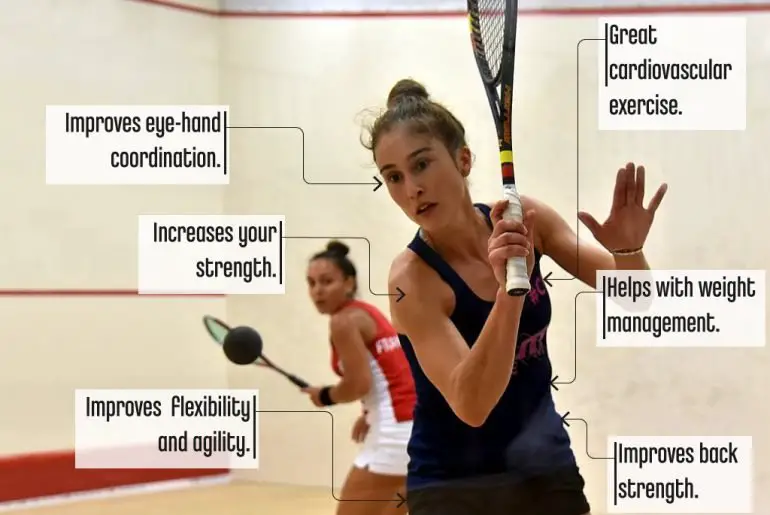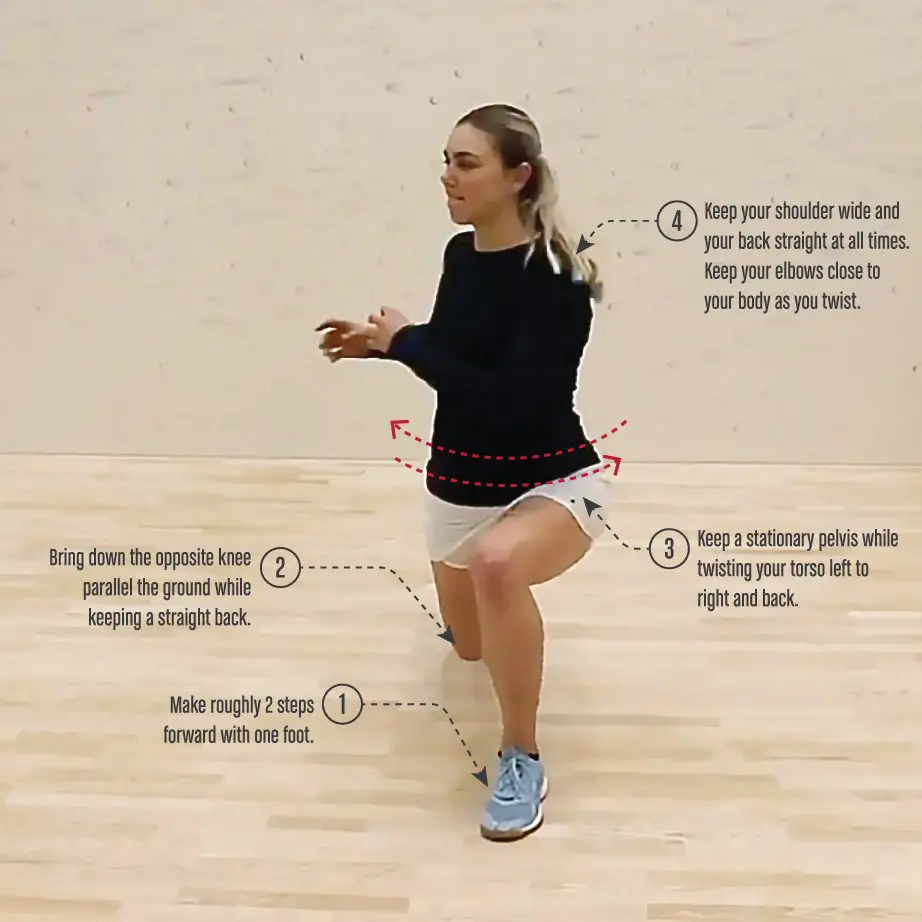[Updated on 1 January 2024] Squash is a great game that is enjoyed by tens of thousands of people all over the world, and it’s also a great way to stay in shape as you age. Although it’s a sport played with a partner and maybe even a partner and another duo, you still get to experience a lot of running around on the court and swinging your racquet, which makes for great exercise every time.
Contents
Advantages of Playing Squash
Before we go into detail on playing squash as you get older, let’s talk about the general health benefits of the game. To be sure, this is a great type of exercise regardless of your age, and a few of the health benefits include:
- It increases your strength
- It is a great cardiovascular exercise
- It can improve eye-hand coordination
- It helps your flexibility and agility
- It helps with weight management
- It helps provide you with a stronger back
Then, there are the psychological benefits to playing squash. Like all exercise, playing squash regularly can improve your self-esteem and your confidence, improve your level of concentration, relieve stress, give you a better sense of happiness and contentment, provide you with a chance to socialize with others and make new friends, and allow you to get exercise regardless of the weather since it is an indoor sport.

Regular exercise is important at all ages, and it is usually recommended that you find an exercise you enjoy doing so that you stick with it. With rare exceptions, squash is a sport you can play for the rest of your life.
If you’re interested in playing squash as you age, it is easier than you think to do so. Below are just a few of the tips you can follow to make sure you stay active and play squash for a very long time.
Always Warm up Properly
Warming up and cooling down are crucial, and this is especially true once you get older. It’s easy to skip these two steps, especially if you’re anxious to get started, but a good warm-up and cool-down lasting 5 to 10 minutes each is a great way to reduce muscle soreness and eliminate the possibility of serious injuries once you start playing.

While we’re on the subject, it’s a good idea to play a light game before you get to the hard-core stuff. Consider it part of your workout and don’t overdo it.
Make a Few Alterations
If you’re older, you can still play squash but you may have to make some changes in how you play the game. For instance, taking your time before you serve or receive serves and preserving your energy can be done even while still getting in some good exercise, and it’s wise to do this.
You can also vary your pace, mix up your serves, and take your time in between games to preserve your energy. Again, you can still get a good workout and exercise your heart muscles even while still taking it a little easier than you used to when you were younger. You simply don’t have to push yourself as much as you did years ago.
Preparation Is Key
Another tip for the aging squash player is to make sure you stay hydrated before, during, and even after the game is over. Drink plenty of water, which you should do even on days that you don’t exercise. Playing squash, even when you’re taking it a little easy, can take away a lot of your energy, and you need “fuel” to replace that energy.
Speaking of feeding your body, you’ll want to eat something about two hours before you exercise to have enough energy to play. If you eat too close to game time, you can have stomach problems and you might not have the strength to play as well. If you play when you haven’t eaten anything in over two hours, you could get dizzy or nauseous in the middle of the game. Ugh!
Make Yourself Comfortable
When people get older, they often become more cold-natured. If this applies to you, check to see if you can turn up the heat a little bit where you’ll be playing. It may be out of your control to adjust the temperature, but if you can make the room a little warmer, you’re likely to be much more comfortable throughout the game.
There is also another advantage to making the room a little warmer – your squash balls will get warmer much quicker, providing you with a way to take full advantage of their bounciness as you play.
Change Your Shots a Little
Older players on the squash court usually benefit from attacking; in other words, try to play drops, kills, and boasts whenever you can. Pounce on anything that isn’t tight, and vary your shots as much as possible. Being “conservative” while playing squash usually works out best for older players.
Go on the offensive and concentrate on a rapid turnaround of points and quick kills. This way, the game will end up being shorter. You’ll still get a good workout, of course, but you won’t be on the court as long and, therefore, you won’t feel as tired when you’re done. We all slow down when we get older, and you don’t have to slow down entirely – just slow down a little bit so that you’ll have energy to do other things once you’re finished playing squash.
This might also mean breaking a few of the rules regarding the game of squash. Learn to anticipate, especially if your opponent always plays straight back down the wall. Consider anything that isn’t tight to the wall a target, and hit different kinds of lobs, drives, and drops. Not all of the rules you learned when you were younger are still the best thing to do now that you’re older.
Returning to the T
If you pay attention to what your opponent is doing, you won’t always have to return to the T. If your opponent doesn’t offer much variety in his shots or the way he plays, you can just stay poised and be ready for what he is likely to do next. This means returning to the T won’t always be necessary, and this can save you a lot of running time.
In short, when you’re older you’ll be able to find ways to expend less energy on the squash court while still being able to get a good workout. If you play your cards right, playing squash over your life won’t be difficult for you. In fact, it is easier than you think to play squash for as long as you have breath in your lungs, provided you do things correctly.
Conclusion
Playing sports like squash as a middle-aged person or even someone older is not as difficult as it seems, and it doesn’t have to be a pipe dream for you. In fact, even if you’ve never played before you can still get started if you start out slow and work up from there. Just make sure you’re prepared both physically and mentally, take good care of yourself, and slow it down some so you won’t end up with injuries or a desire to stop playing.

Leave a Reply